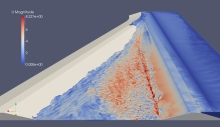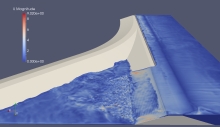HPC User Report from M. Kögel (TH-Nürnberg)
3d‐hydronumeric simulations as part of a Bachelor thesis
CFD simulations are used to perform three‐dimensional simulations by students in connection with Bachelor/Master thesis and other research papers. In this particular case the main focuses were the simulation of dyke overflow and the implementation of measures to prevent damages to the dyke.
Motivation and problem definition
Due to flooding of a one percent annual probability river flood event, a breach of a dyke occurred near the village Nepperwitz in 2002 and 2013 and the infrastructure within the area was damaged. As a result a new dyke was built behind the damaged dyke to guarantee more safety in case of flooding. The main focus of the Bachelor thesis was the investigation of probable damage of the embankment base of the new dyke due to overflow of the old dyke. For that purpose different flood events were simulated and the effect of overflowing water and the resulting hydronumeric properties were investigated. The aim of the study was the implementation of constructive measures based on the results of the thesis.
Methods and codes

With the usage of the open source CFD‐code OpenFOAM, executed at the LiMa cluster of the Erlangen Regional Computing Center (RRZE), numerical models have been developed to be investigated in terms of hydraulic functionality of the structural variations. Based on the highly turbulent flow conditions in the area of the embankment food the simulations needed to be performed under the usage of the Large‐Eddy‐Simulation (LES) method. With this method the large turbulent eddies are being calculated directly and only the smallest turbulent fluctuations are simplified by a modelling procedure. Therefore the claims to the mesh quality are very high and the calculations require huge compute resources.
Results

Due to the investigations executed in the context of the Bachelor thesis, different proposals were made to ensure reasonable assurance in case of flooding and to prevent damaging of the new dyke. Resulting from the short schedule of a Bachelor thesis and the high quality meshes of the flow simulations, powerful computer resources were necessary to conclude the researches in time. This could only be accomplished by the support provided by the RRZE and the LiMa‐Cluster.
Outreach
The execution and the results of the investigations were part of a Bachelor thesis.
Researcher’s Bio and Affiliation
Michael Kögel received his master degree in civil engineering at the Technische Hochschule Nürnberg Georg Simon Ohm and is currently working as a scientific assistant at the Institute for Hydraulic Engineering and Water Resources Management of the Technische Hochschule Nürnberg.
